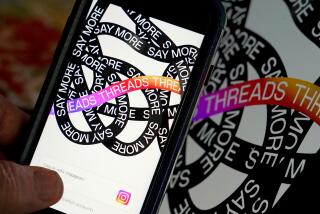Twitter hires former Ticketmaster CEO to lead online commerce
- Share via
SAN FRANCISCO — Twitter hired Ticketmaster’s former chief executive to spearhead an ambitious push into online commerce, fueling speculation that the social network could move quickly toward an initial public offering — as soon as early 2014.
“To me this is just another indication that Twitter is serious about getting its business in order,” said Brian Blau, research director for consumer technologies at Gartner Inc.
But as the most hotly anticipated technology IPO since Facebook, Twitter is moving cautiously, looking to avoid the massive hype that dashed Facebook’s debut.
Analysts say the company is taking steps to make sure its IPO runs more smoothly. Twitter has made key hires with IPO experience and is looking to pump up its revenue prospects with the addition of executives such as former Ticketmaster head Nathan Hubbard, whose hiring was announced Tuesday.
It also has put in place policies that restrict employees from selling stock on the private markets, keeping a lid on the share price. Twitter shares trade for about $20 in the private markets.
Twitter may also limit the number of shares it makes available to the public, even if it means leaving money on the table, analysts say.
And though the 7-year-old company has taken its time to get to an IPO, Twitter is aiming to go public while it’s still in a growth spurt, making it more attractive to investors.
“Twitter learned from the Facebook fiasco,” said Santosh Rao, senior analyst and managing director at Greencrest Capital.
Still, Twitter has a lot of work ahead of it if it wants to crack 1 billion users or lift its business to Facebook levels.
How much money Twitter — valued at about $10 billion — is making is a closely guarded secret. But research firm EMarketer estimates that Twitter will generate $583 million in advertising sales this year. It’s not forecast to cross the $1-billion threshold until 2015, when EMarketer expects Twitter to rake in $1.3 billion in ad revenue.
Counting in its favor: More than half of Twitter’s revenue already comes from mobile advertising, eliminating one of the main concerns investors had about Facebook at the time of its IPO.
Alarm over Facebook’s ability to sell ads on mobile devices drove down shares after the company’s $16-billion IPO in May 2012, the largest tech offering on record.
Facebook shares slipped to as low as $17.73 in September, but have rebounded to IPO levels, buoyed by optimism that it can significantly boost mobile advertising sales. Facebook shares closed at $39.64, down $1.70, on Tuesday, but higher than the IPO price of $38.
“Twitter has the users, so that’s not an issue,” Rao said.”Now the whole issue is how to monetize those users.”
Twitter has been working to build a more mature advertising business while hunting for opportunities to branch out into lucrative areas.
As Twitter’s first head of commerce, Hubbard will be tasked with getting people to shop while posting pithy updates about Miley Cyrus twerking or breaking news on the crisis in Syria.
Hubbard said in an interview that Twitter was aiming to “get people in the moment to buy and to act on their passions.”
“That to me is the opportunity. I look at Twitter as one of the greatest discovery and distribution platforms in the world,” he said.
He said Twitter would form partnerships with merchants and offer them tools to sell goods and services inside tweets, the 140-character messages that users swap on the service. The commerce effort will probably involve Twitter’s “Cards” product, which lets advertisers include more media-rich content and take advantage of Twitter’s real-time nature to sell tickets to concerts and other live events.
“Just as Twitter partnered with content owners to help them better distribute their content, we think about commerce the same way: how we can be a distribution and awareness partner,” Hubbard said.
He declined to say whether Twitter would team up with providers of payment services or would get into payments itself. He also would not say whether Twitter would take a percentage of transactions or how Twitter planned to make money from shopping purchases.
Twitter will be competing against Facebook, Google Inc. and others to prove that it also can get shoppers to click the “buy” button. Facebook is said to be pushing a new commerce initiative of its own to make it easier to buy goods and services from bricks-and-mortar merchants on mobile devices. Twitter is working with Datalogix to track when ads on its site, called Promoted Tweets, lead to purchases.
Commerce is the next logical step in Twitter’s efforts to connect advertisers with customers and prospective customers, Gartner’s Blau said.
But, he cautioned, it’s not yet clear whether people who hang out on social networks to catch up with friends and family or to read the latest quips from the people they follow will also want to shop there.
“Activity that people do on a social network is not necessarily the most natural place for commerce to happen,” Blau said.
Wedbush Securities analyst Michael Pachter called Hubbard “a good hire” but questioned whether his background in music would help him formulate a winning e-commerce strategy for Twitter.
Hubbard “obviously understands consumers and payment mechanisms, but without knowing their strategy, I can’t say whether he’ll succeed,” Pachter said.
More to Read
Inside the business of entertainment
The Wide Shot brings you news, analysis and insights on everything from streaming wars to production — and what it all means for the future.
You may occasionally receive promotional content from the Los Angeles Times.










